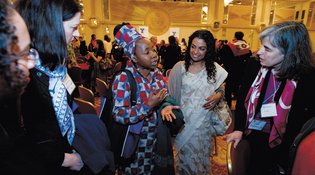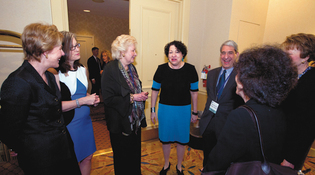 loading
loading
Light & VerityThe alumnae summitYale women meet in a mood of disarming frankness.  Jose Luis MaganaYaleWomen convene (left to right): Josephine Sandler Nelson ’96, Yale World Fellows alumnae Kah Walla and Subhashini Chandran, and Lisa Goldman ’74. View full imageAbout 15 minutes into the first meeting of the new YaleWomen network, it became clear that this was not one of those conferences where speakers explain how to manage your wealth or publish your book or otherwise give a tour of their methodically built success as a primer for yours. The morning began familiarly enough: 430 smartly dressed guests in a darkened ballroom at a Washington, DC, Hilton, nursing their Starbucks coffee and listening to the marquee speaker on a lit stage, Supreme Court justice Sonia Sotomayor ’79JD. But when asked about how her childhood made her the jurist she is now, Sotomayor drew the vast room close to her, unpacking a vivid memory of the fights between her alcoholic father and her angry, anguished mother. “We went to parties and my father would drink and after some time, his face would become like a Frankenstein’s mask because of alcoholic neuropathy,” she says. “Then my mother would get angry and my parents would start fighting. I watched my parents. And I watched people watching them. I became an observer, and that is a trait that helps me so much as a lawyer.” Whether Sotomayor’s talk set the tone or reflected the mood of the participants, the inaugural get-together of YaleWomen was marked by a disarming frankness. From freshly minted graduates to those who attended Yale’s professional schools in the 1950s, alumnae seemed happy to connect with generations of women like them. They celebrated the achievements of speakers and listened rapt to their advice. At the same time, speakers and participants voiced frustration with longstanding policies that fail to take account of differences in the health needs of men and women; with the paucity of women in tech and politics; and with the enduring difficulty of balancing work and family. Most startling, and perhaps something that would not have surfaced if men were present, speakers and guests openly discussed their struggles and fears, which, rather than dampening spirits, seemed to heighten the intimacy being built that day among Yale women. “I am my mother’s daughter,” Sotomayor said, sitting in an armchair on stage, as she fielded questions from veteran PBS journalist Margaret Warner ’71. “And I had her sense of just not being good enough at anything.” On either side of the stage, Sotomayor’s two Supreme Court Police officers, symbols of her success, stood facing the dimmed room. In front of them, dozens of Yale women nodded in agreement.  Jose Luis MaganaLeft to right: Yale vice president Linda Koch Lorimer ’77JD, Ellen Gibson McGinnis ’82, Corporation member Margaret Marshall ’76JD, Supreme Court justice Sonia Sotomayor ’79JD, president Peter Salovey ’86PhD, and Law School professor Judith Resnik. View full imageThere are other subgroups of Yale alumni—varsity athlete alumni, Latino alumni, and singing group alumni, to name a few. But only now, 43 years after coeducation at Yale College and 143 years after the first female students arrived at Yale’s art school, have Yale alumnae formed their own network. With 12 chapters in the United States and Canada and a standing invitation to grads to start their own, YaleWomen says its mission is “advancing women’s voices and perspectives and enriching and inspiring one another, Yale, and the world.” The inaugural conference on April 19 and 20 sold out. Women came to network. They came out of curiosity and to renew ties with Yale. Jean Hoffman ’03 had never been involved with women’s groups at Yale. But she flew in from Tucson to join her friend, Jessica Dimson ’03, who had come from New York. “After ten years, the experience of Yale becomes more distant, and this brings back the experience,” Dimson said. “You realize you’re part of something bigger. At our table just now, we sat with some women who were at Yale when there were no undergraduate women.” The trajectory of women’s life and work experiences and the challenges they face resonated with Hoffman. “You’re more aware of the odds now and more comfortable talking about them,” she said. Then the two women rushed off to a panel on innovation and entrepreneurship, where Donna Dubinsky ’77, former chief executive of Palm, urged women to join industries that are growing. As part of that, she encouraged more women to enter—and have their daughters enter—tech and computer science. Unilever vice president Gina Boswell ’89MPPM told women to go where they “are celebrated, not just tolerated,” to pick their bosses carefully, and, if they rise, to pull up other women, too. A strain of activism wove through the sessions. Women from other nations—former participants in the Yale World Fellows program—spoke of their experience in business, health, and building civil society. Repeatedly, panelists and some audience members said that making the changes that would improve women’s lives, including righting the elusive work-family balance, would require some policy changes. At a panel about women’s health, for instance, speakers urged women to push for greater federal funding for women’s health research, because, for years, research used only male subjects. Speakers at several panels urged women to run for political office. “I don’t think this is about ‘Lean In,’ but ‘Lean Out,’” said Jane Mayer ’77, a staff writer for the New Yorker, referring to Facebook chief operating officer Sheryl Sandberg’s much-discussed book Lean In. Changing women’s lives, she said, “is about policy and legislation.” Mayer, with others in filmmaking and media, was on the last panel of the day, titled “Having Our Say: Women at the Table.” It was after lunch, the room dark again, but no one was sleepy. Hands shot up at question time. At the far end of the ballroom, folding doors were opening to the warm light of the cocktail reception. But most of the women were reluctant to leave the main ballroom’s discussion about changing a still-vexing status quo. YaleWomen chair Ellen Gibson McGinnis ’82 told them that they didn’t have to. “Fifty-five thousand Yale women can change the world,” she said in her closing remarks. “Now let’s go do it.”
The comment period has expired.
|
|